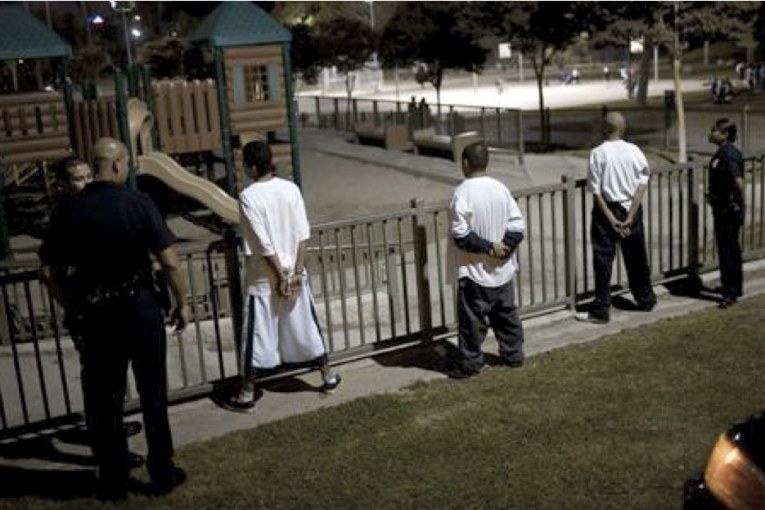

In 2010, the Vanguard’s fledgling Court Watch Project followed a six-month Yolo County trial as a group of lawyers, volunteering their time, attacked the West Sacramento Gang Injunction. Despite extensive efforts to show that what the Yolo County DA was calling an ongoing criminal gang nuisance was largely a scattered group of crimes – some of them not even charged as gang crimes – over a period of a decade.
But a judge disagreed and imposed a gang injunction.
As an October 2019 article in the Appeal points out: “The gang database in the state gives police increased authority to approach and harass people for virtually no reason at all.”
The article notes that alleged gang members are “subject to policing based on the California gang database, an imprecise and sweeping list of everyone the police suspect of gang affiliation. The database is state-funded but unregulated and maintained by law enforcement.”
Furthermore, the STEP Act has helped shape the state’s gang laws, which “has given prosecutors broad latitude to charge people with felonies even when they didn’t personally engage in misconduct.”
The problem begins with the documentation of gang activity – “labeling certain people as gang members in the CalGang database.”
The Appeal notes: “How people get into the database varies wildly. Tattoos and arrests can certainly cause documentation, but so can neighborhoods, friendships, families, or even schoolbook
 marginalia.”
marginalia.”
The key factor: “Police use these tactics almost exclusively to document people of color—only about 8 percent of documented individuals are white, according to a 2015 audit of the CalGang database.” And then presence in this gang database “gives police increased authority to approach and harass people for virtually no reason.”
All of this came out of the 1980s and fears of gang violence and the crack war. Chapter 11 of the STEP Act was added to the legislature in 1988 and includes the provisions under Penal Code section 186.22, which govern enforcement of gang activity including gang enhancements – which can add between one and three years to a sentence, per count.
As noted in the the preamble – 186.21: “The Legislature… further finds that the State of California is in a state of crisis which has been caused by violent street gangs whose members threaten, terrorize, and commit a multitude of crimes against the peaceful citizens of their neighborhoods. These activities, both individually and collectively, present a clear and present danger to public order and safety and are not constitutionally protected.”
But times are changing – and gang enhancements are drawing increased opposition in California as statistics show that they are overwhelming used against people of color in poor neighborhoods.
An article recently in the San Francisco Chronicle for instance pulled state prison records showing that “of 11,484 inmates who were serving sentences with a gang enhancement as of Aug. 31, 68% were Hispanic and 24% were black. Just 3% were white.”
As a result. the progressive prosecution movement is now taking aim at gang laws.
When Chesa Boudin announced his candidacy for DA in January, he noted, “I think that the way that gang allegations and enhancements are prosecuted in San Francisco and in much of California, if not the country, are explicitly racist.”
He added, “If someone is involved in a substantive criminal act, whether it be gun possession or drug sales or an assault, they can be prosecuted for the substantive criminal act, but adding gang enhancement allegations and charges as a basis to dramatically increase the punishment and the scope of evidence that’s potentially admissible is unethical.”
In an interview with the Chronicle, Chesa Boudin told them, “I want to focus on holding people accountable for what they’ve done — not who they are. People are seeing their families impacted by overzealous uses of these gang allegations.”
He continues to maintain that gang enhancements are “infused with racism.”
But of course not everyone believes that. Some argue that gang enhancements are valuable tools protecting people in neighborhoods that have been plagued by gang violence and that these laws have prompted steep declines in homicides across the state.
“Getting rid of the gang enhancement assumes that there’s no gang problem,” said Eric Siddall, a Los Angeles County gang prosecutor and vice president of the Association of Los Angeles Deputy District Attorneys. “The law was created for a very specific purpose with a very specific target and for very specific violence.”
Demonstrating a key shift in the landscape, when George Gascón was San Francisco DA, the office charged gang enhancements. However, as the Chronicle reports, he did so “only in the most serious instances.”
He now appears to have changed his position. He noted in a recent debate that “he would stop charging gang enhancements and support statewide efforts to repeal the law.”
In our time of covering the court over the past decade, we often noted marginal gang charges thrown against defendants of color. Attaching gang charges have a number of added advantages for prosecutors – under previous state laws it allowed for direct filing charges against juveniles as adults, and it prejudices the jury.
Gang crimes allow for the introduction of certain perquisite crimes to establish gang activity.
As the Appeal points out, prosecutors are allowed to “to prove the defendant’s guilt using evidence of other crimes committed by other documented members of an alleged gang whom the defendant may not even know.”
That makes it much more likely to get some sort of conviction.
But what about for serious gang cases involving shootings, robbery, assault and murder? Why not simply charge the underlying crimes? It seems pretty rare that clearly illegal activity by a gang member cannot be charged simply for the underlying crimes without the need to add years if not decades due to guilt by association.
—David M. Greenwald reporting

